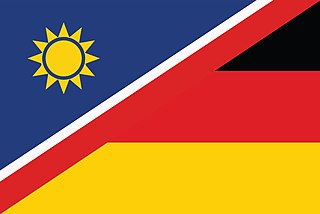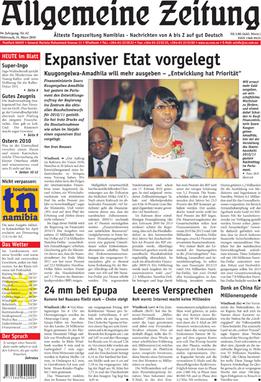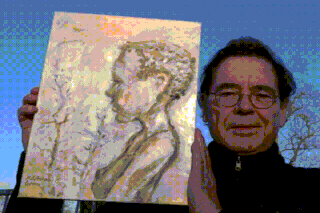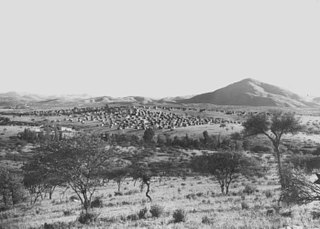
Windhoek is the capital and largest city of Namibia. It is located in central Namibia in the Khomas Highland plateau area, at around 1,700 m (5,600 ft) above sea level, almost exactly at the country's geographical centre. The population of Windhoek, which was 486,169 in 2023, is constantly growing due to a continued migration from other regions in Namibia.
Katuutire Kaura was a Namibian politician. He was president of the Democratic Turnhalle Alliance (DTA) from 1998 to 2013 and was the official leader of the opposition from 2000 to 2005.

The Popular Democratic Movement (PDM) is an amalgamation of political parties in Namibia, registered as one singular party for representation purposes. In coalition with the United Democratic Front, it formed the official opposition in Parliament until the parliamentary elections in 2009. The party currently holds 16 seats in the Namibian National Assembly and one seat in the Namibian National Council and is the official opposition. McHenry Venaani is president of the PDM.

The Republican Party is a political party in Namibia. Henk Mudge was its President and its sole representative in the National Assembly. Prior to the 2004 parliamentary election, the Republican Party was part of the Democratic Turnhalle Alliance (DTA). It was revived as an independent party in 2003, and won 1.9% of popular votes and one National Assembly seat.
Dirk Frederik Mudge was a Namibian politician. He served in several high-ranking positions in the South African administration of South West Africa, was the chairman of the 1975–1977 Turnhalle Constitutional Conference, and co-founded the Republican Party (RP) of Namibia as well as the Democratic Turnhalle Alliance (DTA), now known as the Popular Democratic Movement (PDM).

German Namibians are a community of people descended from ethnic German colonists who settled in present-day Namibia. In 1883, the German trader Adolf Lüderitz bought what would become the southern coast of Namibia from Josef Frederiks II, a chief of the local Oorlam people, and founded the city of Lüderitz. The German government, eager to gain overseas possessions, annexed the territory soon after, proclaiming it German South West Africa. Small numbers of Germans subsequently immigrated there, many coming as soldiers, traders, diamond miners, or colonial officials. In 1915, during the course of World War I, Germany lost its colonial possessions, including South West Africa ; after the war, the former German colony was administered as a South African mandate. Roughly half of the German settlers were allowed to remain and, until independence in 1990, German remained an official language of the territory alongside Afrikaans and English.

Henry Ferdinand Mudge is a Namibian politician and President of the Republican Party. He was the party's only member of the National Assembly of Namibia from 2004 to 2011, when he resigned.

The Allgemeine Zeitung founded in 1916, is the oldest daily newspaper in Namibia and the only German-language daily in Africa to survive World War I.
2009 in Namibia refers to the events which occurred and will occur in the year of 2009 in the Republic of Namibia.
Stefanus "Steve" Orateng Mogotsi is a Namibian politician and former featherweight boxer.

Hans Ulrich "Uli" Aschenborn is a Southern African animal painter. The musea in Windhoek and Swakopmund (Namibia) have artwork of Uli as well as the National Art Gallery of Namibia.

The Old Location was an area segregated for Black residents of Windhoek, the capital of Namibia. It was situated in the area between today's suburbs of Hochland Park and Pioneers Park.

Namibia is a multilingual country in which German is recognised as a national language. While English has been the sole official language of the country since 1990, in many areas of the country, German enjoys official status at a community level. A national variety of German is also known as Namdeutsch.
The Augustineum Secondary School, established in 1866, is among the oldest schools in Namibia. Originally situated in Otjimbingwe, it was relocated to Okahandja in 1890, and finally to Windhoek in 1968. Previously also known as the Augustineum Training College and today the Augustineum Secondary School, it is a public school located in Khomasdal, a suburb of Windhoek.
Mburumba Kerina was a Namibian politician and academic. He was a co-founder of SWAPO, NUDO, and FCN, and the founder of a host of smaller political parties. For independent Namibia, he was a member of Namibia's Constituent Assembly, as well as the National Assembly and the National Council. Kerina coined the name "Namib" for the independent state "Namibia" on the territory of South West Africa.

Henning Melber is a German political scientist and sociologist. He is a German-Namibian and Swedish Africanist and political activist.
The following is a timeline of the history of the city of Windhoek, Namibia.

General elections were held in Namibia on 27 November 2019. Ballots were cast using electronic voting. A total of eleven candidates ran for the presidency and fifteen political parties contested the National Assembly elections.











